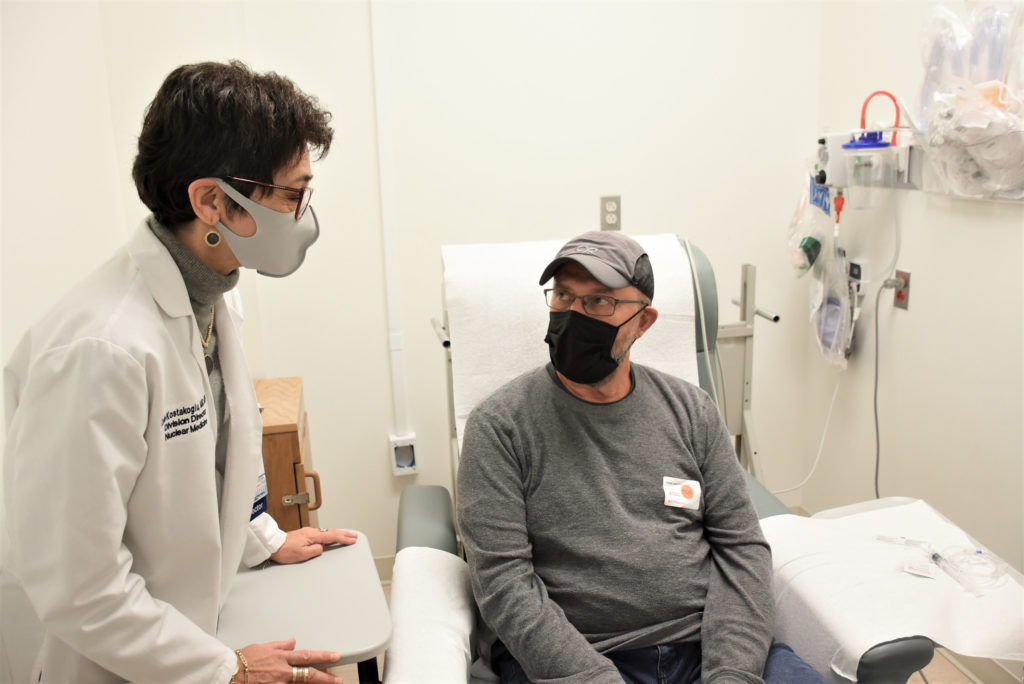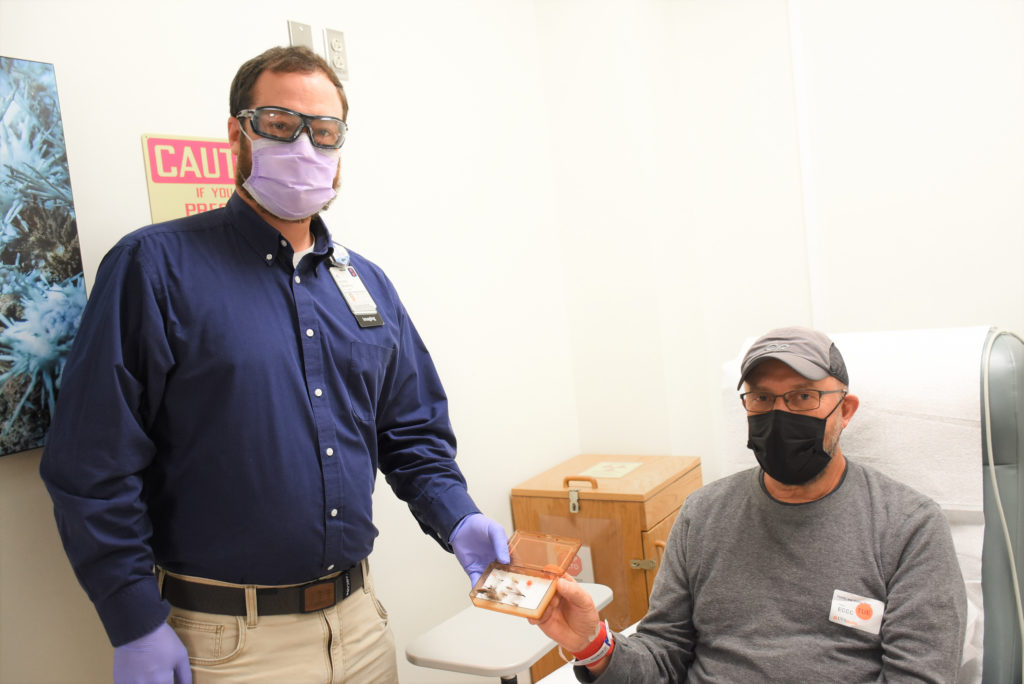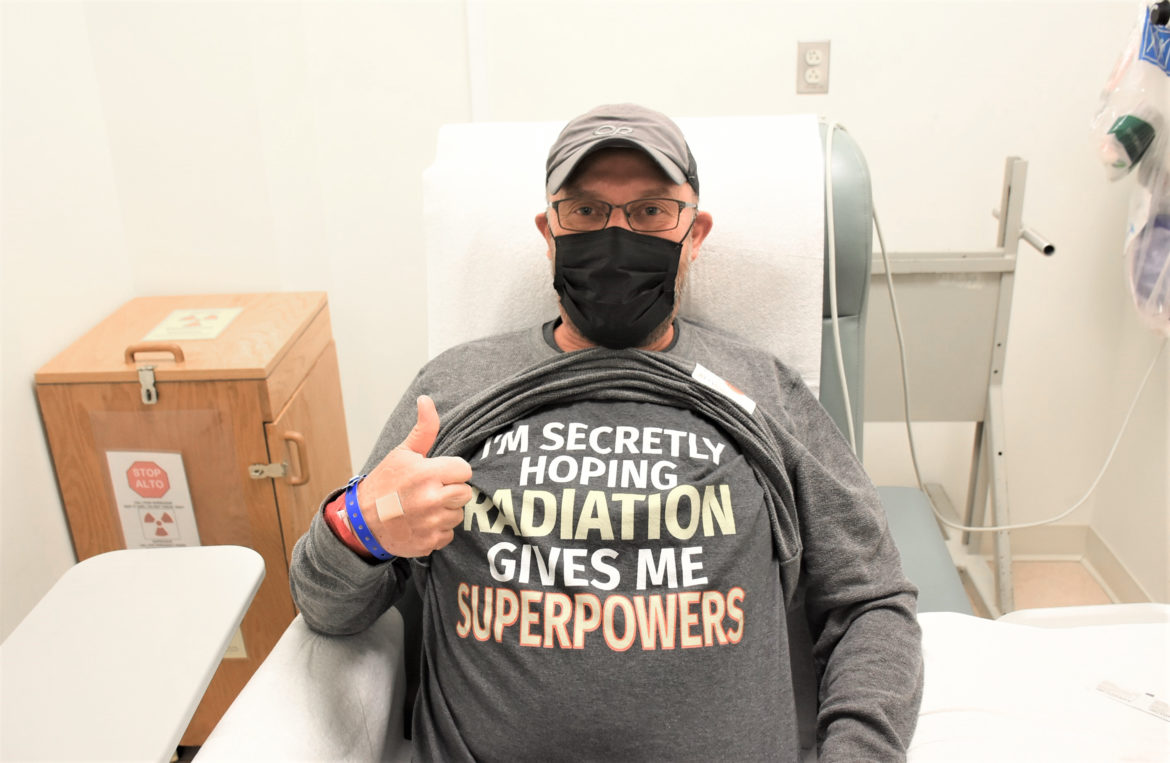Lutathera is a treatment that slows down or stops neuroendocrine tumor growth. UVA Health is one of the first hospitals in Virginia to offer this new radioactive drug. And Fred Romine is the first patient to complete all four rounds of Lutathera treatment at UVA. Here, he shares about his medical journey and experience with Lutathera treatment at UVA.
Speaking over the phone from his home near the Blue Ridge Mountains in southwestern Virginia, Fred Romine, 67, is grateful for those who’ve helped him on his long medical journey.
In 2011, doctors diagnosed Fred with a neuroendocrine tumor in his bowel. Neuroendocrine tumors (or NETs) are a rare type of cancer that most often originate in the GI tract.
After Fred’s diagnosis, he had the part of his small bowel with the tumor removed. But not all the cancer cells could be removed – some moved to his liver. That’s a common pattern for NETs.
In 2016, he had a portion of his liver removed. This was followed by a minimally invasive interventional radiology procedure called radioembolization. In that procedure, doctors deliver microscopic radioactive beads to the liver to stop cancer cells from growing.
But Fred continued to feel unwanted effects from these tumors, and so in July 2020, he began Lutathera. Lutathera is a new treatment option for neuroendocrine tumors that was recently approved in the United States. UVA Health is one of the few hospitals in Virginia to offer it.
What is Lutathera?
Lutathera is the first Peptide Receptor Radionuclide Therapy (PRRT) approved to treat NETs in the United States. It has two components: molecules that bring the drug directly to the tumors, and radiation that helps shrink and kill those tumor cells.
Because Lutathera specifically targets tumor cells, the effects of the radiation are much less intense than with traditional radiation therapy. That means fewer side effects.
Lutathera is given in four infusions, 8 weeks apart. In between those infusions, patients have blood tests done every two weeks. The total treatment time is about 6 months.
Click here to learn more about the Lutathera treatment experience at UVA Health.
Fred’s Lutathera Experience
By the time Fred began to consider Lutathera, he was familiar with many different kinds of treatments and procedures. Like all medical decisions, Fred’s choice to try Lutathera was a personal one, made in consultation with his wife, Linda, and his doctors.
Beginning a new treatment can be an intimidating experience. When Fred arrived at the Nuclear Medicine clinic in the Emily Couric Clinical Cancer Center at UVA to receive Lutathera for the first time, he was scared.
“Of course, you’re scared,” says Fred. “But the first injection went really well. I didn’t have any bad sickness or anything like that, any nausea.”
The nurses gave him two IVs – one to deliver amino acids, to protect his kidneys during the treatment, and the other to deliver Lutathera into his bloodstream. After an hour of Lutathera infusion, he continued on amino acids for a few hours more, than had imaging done. All in all, the treatment took six to seven hours.
“Each time was pretty much the same,” continues Fred. “By the second shot, you know what to expect. The third, the fourth were the same. I would get shakes, my bowels weren’t quite normal. And I would be tired. I always have to take naps afterwards, and that’s not normal for me. But other than that, no other problems.”
Being able to go to the same clinic each time, and have the same staff caring for him made the experience much more comfortable.
“Going back with the same staff each time is a plus,” says Fred, “because they get to know you, and it makes it so much easier. Again, you’re scared going in there to do it. But the nurses (and technologists) were really a tremendous comfort for me and my wife.”
A Community of Care

As the first patient to complete all four rounds of Lutathera treatment at UVA, Fred is full of thanks for the many people who helped him along the way. They’ve really come to make a community around him and Linda.
“Dr. (Lale) Kostakoglu, (Chief of Nuclear Medicine) – she runs a tight ship.” says Fred. “She’s well organized and has high standards for her staff, which is a very good thing for us patients.”
“Two nurses in Nuclear Medicine, Elizabeth Veasey and JoAnn Phillips, were like hovering and doting mothers to me. They’d call all the time to check and see if I was doing alright.”
“And of course, the technologists, Hunter (Beverley, Chief Nuclear Medicine Technologist) and his team, are an absolute hoot. They are all great. This is a scary thing to do, but yet, you have these people to hang on to for support.”

“Fred carries himself with a lot of dignity,” says Hunter. “He’s somebody you feel like you’ve known for a long time, even when you just meet him. When you come to the hospital you can have tough experiences, but even during tough times, he was able to open up and share with us about his life. We really bonded over similar interests.”
“I can’t say enough about UVA,” Fred continues. “The support teams there are just unbelievable. Paula Capobianco, a social worker – we leaned on her all the time, all through this, with questions and worries. We still call her and chat with her. Julie Perry, the Chaplain – I can’t praise her enough.”
“And I’m grateful for Dr. (William) Grosh (Oncologist), who recommended me for Lutathera,” says Fred. “He was like a big brother to me, even though he retired before I had my last shot. My new oncologist, Dr. Reilly, and nurse Kira McBee have also been so supportive during my last treatment.”
Fred is immensely grateful for all the help from his medical team and others at UVA. But there’s one person who, above all others, is responsible for giving him strength to continue this long journey.
“Ten years ago, I never imagined having to go through all this. It takes a special person to help get you through it. And that’s my wife, Linda. She’s so versed on cancer and she’s been my support, every single day. We’ll be married 50 years this year, and there’s no question that she’s what got me through this.”
Fred Romine
Helping Others, Spreading Hope
Fred knows that receiving a diagnosis of neuroendocrine tumors and thinking about treatment can be daunting. That’s why he wants to help others who are just starting along a similar path and who may be thinking about Lutathera as a treatment option.
“I’m in a research program right now, through the UVA Cancer Center, doing what I can to help someone else (in my shoes),” he says. And Fred wants to share his story with others, to tell them to not give up, to keep trying things, to still have hope.
“Here’s a thing you can overcome, as long as you have support,” he says. “I want to try and release people’s fear about this. Because Lutathera gives me hope. That’s how I would say it to people who are thinking about going through this. It’s going to give me back the quality of life I’m used to. It’s not easy, but it’s worth it. It gives me hope.”
To learn more about Lutathera treatment for neuroendocrine tumors at UVA Health, click here. Referrals for Lutathera must come from your hemotologist, oncologist or other ordering provider. Providers: refer a patient for Lutathera by calling the Lutathera nurse at 434.982.5240.
text-align



